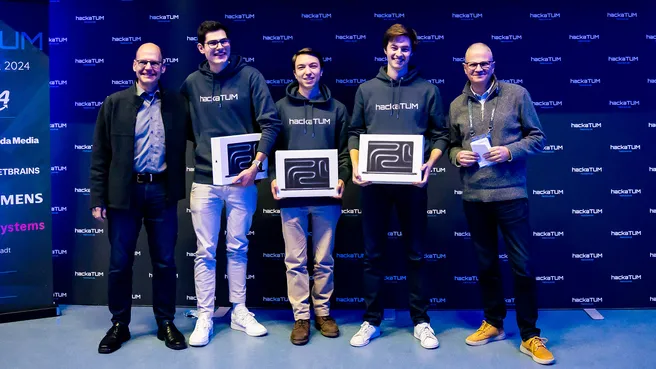The official hackathon of the TUM School of Computation, Information and Technology (CIT) took place for the ninth time last weekend. Originating from a research project, the programming competition has developed into one of the largest of its kind in Europe. Over 2,000 applications were received this year. An “absolute record” according to the organizing team. Over 70 percent of these came from TUM students. The remaining 30 percent came from over 100 universities from four continents – because it is not necessary to be enrolled at TUM to take part in hackaTUM. 900 participants were selected.
Coding over the weekend
“Anyone who is enthusiastic about coding and can hold out for 36 hours can take part,” explains Alexandra Klymenko with a smile. The PhD student from the Chair of Software Engineering for Business Information Systems has been organizing the weekend event in her free time for several years now, together with her colleagues Stephen Meisenbacher, Franziska Tobisch and Juraj Vladika. 35 volunteers from the CIT supported the team over the three days of the event. 10 sponsoring companies provided the challenges this year. “On Friday evening, the participants were introduced to the various tasks,” explains Alexandra Klymenko. “These are real problems from everyday life.” There was also a so-called “wild track” where participants could present their own tasks. In addition to the challenges, the companies also offered workshops and networking events.
Tight schedule, little sleep
Once the teams of two to four people had been formed, it was: eat, code, drink, repeat. The schedule was tight and there was not much sleep during the weekend. The aim was not just to develop a concept over the weekend. At the end, there had to be a finished product, for example in the form of an app – including a convincing short presentation. The organizers not only provided the necessary food and plenty of energy drinks to keep the participants going. On Saturday, a Music Mania quiz and PowerPoint karaoke ensured a great atmosphere and a further boost of motivation. On Sunday, the results of the challenges were evaluated by the respective sponsoring companies and two winning teams were determined.
Top 22 compete to choose the winning team
best 22 groups from all tracks – there was a first and second place each – competed to choose the overall winning team at the end. The jury, consisting of Florian Matthes, Professor of Software Engineering for Business Information Systems and Jörg Ott, Professor of Connected Mobility, decided in favor of the team “Clarity - The Copilot for Journalists”. Ron Autenrieb, Simon Gräber and Theodor Stöcker had chosen the challenge “AI-driven news generation about electric vehicles” from a large media group.
The focus was on the development of an AI-driven news platform on the topic of electric vehicles. The system was to retrieve the latest news from the best sources, analyze the content with AI and generate dynamic articles and images – all in real-time. With the help of AI research tools, the aim was to add diverse, relevant context to each story and provide readers with engaging insights. “We developed Clarity with a React TypeScript frontend that is connected to a Python backend via OpenAPI,” the three developers explain their solution. “The backend is responsible for parsing RSS feeds and uses OpenAI together with other Large Language Models to provide important functions such as text generation and fact-checking.” This seamless integration ensures a robust and efficient system that provides journalists with reliable tools for their workflow.
Looking forward to the hackaTUM anniversary
The outstanding commitment of all the winning teams was rewarded with many attractive prizes like high-quality electronics. For many participants, the prizes are not the main focus. “hackaTUM is not just a programming competition, but also a great opportunity to have fun and make new friends with cool people who share the same enthusiasm,” says Alexandra Klymenko. For her and her co-organizers, the enormous effort involved in preparing and running the hackathon was well worth it. “We're really looking forward to 2025,” reveals the doctoral student. “We'll be celebrating ten years of hackaTUM and want to top all previous events.”
